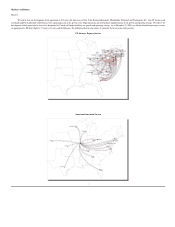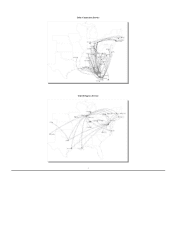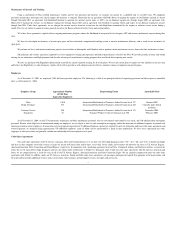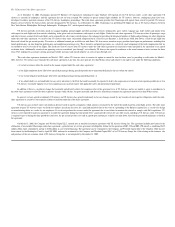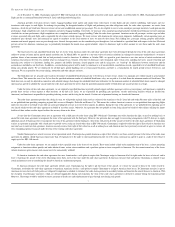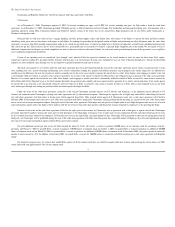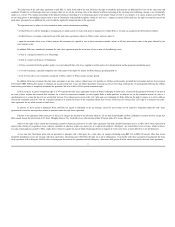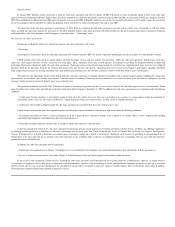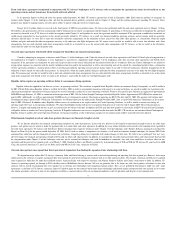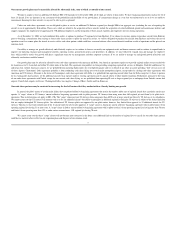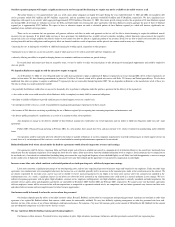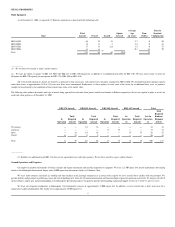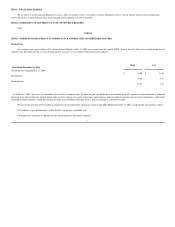Frontier Airlines 2004 Annual Report Download - page 19
Download and view the complete annual report
Please find page 19 of the 2004 Frontier Airlines annual report below. You can navigate through the pages in the report by either clicking on the pages listed below, or by using the keyword search tool below to find specific information within the annual report.
Government Regulation
All interstate air carriers are subject to regulation by the Department of Transportation, referred to as the DOT, the Federal Aviation Administration, or FAA, the TSA, or Transportation
Security Administration and certain other governmental agencies. Regulations promulgated by the DOT primarily relate to economic aspects of air service, those of the TSA to security and those
of the FAA to safety. The FAA requires operating, air worthiness and other certificates; approval of personnel who may engage in flight maintenance or operations activities; record keeping
procedures in accordance with FAA requirements; and FAA approval of flight training and retraining programs. Generally, governmental agencies enforce their regulations through, among other
mechanisms, certifications, which are necessary for our continued operations, and proceedings, which can result in civil or criminal penalties or revocation of operating authority. The FAA can
also issue maintenance directives and other mandatory orders relating to, among other things, grounding of aircraft, inspection of aircraft, installation of new safety
-
related items and the
mandatory removal and replacement of aircraft parts that have failed or may fail in the future.
We believe that we are operating in material compliance with FAA regulations and hold all necessary operating and air worthiness certificates and licenses. We incur substantial costs in
maintaining our current certifications and otherwise complying with the laws, rules and regulations to which we are subject. Our flight operations, maintenance programs, record keeping and
training programs are conducted under FAA
-
approved procedures.
The DOT allows local airport authorities to implement procedures designed to abate special noise problems, provided such procedures do not unreasonably interfere with interstate or
foreign commerce or the national transportation system. Certain airports, including the major airports at Boston, Washington, D.C., Chicago, Los Angeles, San Diego, Orange County
(California) and San Francisco, have established airport restrictions to limit noise, including restrictions on aircraft types to be used and limits on the number of hourly or daily operations or the
time of such operations. In some instances, these restrictions have caused curtailments in services or increases in operating costs, and such restrictions could limit our ability to commence or
expand our operations at affected airports. Local authorities at other airports are considering adopting similar noise regulations.
Pursuant to law and the regulations of the DOT, we must be effectively controlled by United States citizens. In this regard, our President and at least two
-
thirds of our Board of Directors
must be United States citizens and not more than 25% of our voting stock may be owned or controlled by foreign nationals (although subject to DOT approval the percent of foreign economic
ownership may be as high as 49%).
Risk Factors
The following risk factors, in addition to the information discussed elsewhere herein, should be carefully considered in evaluating us and our business:
Risks Related to Our Operations
We are dependent on our code
-
share relationships with our major partners.
We depend on relationships created by our code
-
share agreements with US Airways, American, Delta and United for all of our passenger revenue. Any material modification to, or
termination of, our code
-
share agreements with any of these partners could have a material adverse effect on our financial condition, the results of our operations and the price of our common
stock. Each of the code
-
share agreements contains a number of grounds for termination by our partners, including our failure to meet specified performance levels. In addition, American may
terminate the code
-
share agreement without cause upon 180 days notice, provided such notice may not be given prior to September 30, 2008. If American terminates our code
-
share agreement
for cause, it has the right to require us to assign to them our leases of all Embraer regional jets then operating under the code
-
share agreement or to lease such jets to them to the extent we own
them. If American terminates our code
-
share agreement other than for cause, we have the right to require American to assume our leases of all Embraer regional jets, or to lease such jets from us
to the extent we own them, then operating under the code
-
share agreement. Delta may partially or completely terminate the code
-
share agreement with Chautauqua, with or without cause, on
180 days written notice at any time after November 2009, and may partially or completely terminate the code
-
share agreement with Republic Airline, with or without cause, on 180 days written
notice at any time after July 2012. If Delta exercises this right under either agreement or if we terminate either agreement for cause, we have the right to require Delta to either purchase, sublease
or assume the lease of aircraft leased by us with respect to any of the aircraft we previously operated for Delta under that agreement. If we choose not to exercise this right, or if Delta terminates
either agreement for cause, Delta may require us to sell or sublease to them or Delta may assume the lease of aircraft leased by us with respect to any of the aircraft we previously operated for
them under that agreement. United may terminate its code
-
share agreement with Chautauqua without cause on 18 months prior written notice, provided that such notice may not be given prior to
December 31, 2007. If either Chautauqua or Republic Airline wrongfully terminates its code
-
share agreement, breaches certain provisions thereof or falls below certain minimum operating
thresholds for three consecutive months or any six month period in a rolling 12 month period, United can assume our ownership or leasehold interests in the jets we operate for them. For a more
complete description of our code
-
share agreements, including their termination provisions, see "Business
-Code-
Share Agreements."
In addition, because all of our passenger revenues are currently generated under the code
-
share agreements, if any one of them is terminated, our operating revenues and net income will
be materially adversely affected unless we are able to enter into satisfactory substitute arrangements or, alternatively, fly under our own flight designator code, including obtaining the airport
facilities and gates necessary to do so. We cannot assure you that we would be able to enter into substitute code
-
share arrangements, that any such substitute arrangements would be as
favorable to us as the current code
-
share agreements or that we could successfully fly under our own flight designator code.
For the years ended December 31, 2004 and 2003, respectively, US Airways accounted for 41% and 40% of our passenger revenues, Delta accounted for 35% and 29% of our
passenger revenues, American accounted for 17% and 23% of our passenger revenues, United accounted for 7% and 0% of our passenger revenues. America West accounted for 0% and 8%
of our passenger revenues. In February 2003, we and America West mutually agreed to terminate our code
-
share agreement and we concurrently agreed with Delta to allocate the aircraft
previously flown for America West to Delta. We have granted to Delta warrants to purchase an aggregate of 3,435,000 shares of our common stock, including warrants to purchase
960,000 shares of common stock. The exercise prices of these warrants range from $11.60 to $13.00 per share. In addition, beyond the 16 aircraft we are contractually committed to place into
service for Delta through 2006, Delta is entitled to a warrant to purchase 60,000 shares of our common stock for each additional aircraft we place into service for them. The exercise price of
each of these warrants will be the lower of the then current market price of our common stock or the average of the closing prices of our common stock for the 30 days prior to an aircraft being
placed into service.
14


